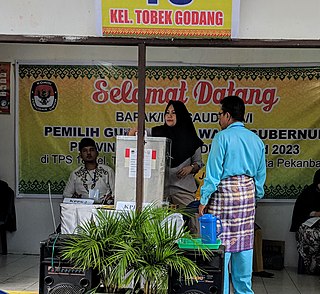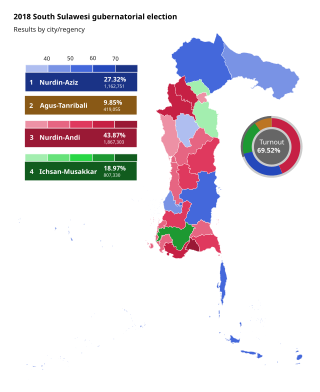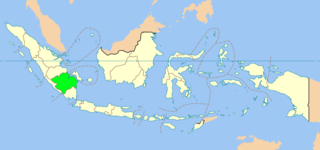Related Research Articles

Elections in Indonesia have taken place since 1955 to elect a legislature. At a national level, Indonesian people did not elect a head of state – the president – until 2004. Since then, the president is elected for a five-year term, as are the 575-member People's Representative Council, the 136-seat Regional Representative Council, in addition to provincial and municipal legislative councils.
Indonesia is divided into provinces. Provinces are made up of regencies and cities (kota). Provinces, regencies, and cities have their own local governments and parliamentary bodies.

The Indonesian Solidarity Party is a political party in Indonesia that focuses on women's rights, pluralism, and Indonesian youth. It is led by Kaesang Pangarep who is the youngest son of President Joko Widodo. He joined the party on 23 September 2023 and became the general chairman on 25 September 2023.

Local elections were held in Indonesia on 27 June 2018. Voters elected 17 governors, 39 mayors and 115 regents across the country. The elections included gubernatorial elections for Indonesia's four most populous provinces: West Java, East Java, Central Java and North Sumatra.

The 2018 West Java gubernatorial election took place on 27 June 2018 as part of the simultaneous local elections. It was held to elect the governor of West Java along with their deputy, whilst members of the provincial council will be re-elected in 2019.

The 2018 South Sulawesi Gubernatorial Election took place on 27 June 2018 as part of the simultaneous local elections. It was held to elect the governor of South Sulawesi along with their deputy, whilst members of the provincial council will be re-elected in 2019.

Local elections were held in Indonesia on 15 February 2017, with a single run-off for Jakarta on 19 April 2017. The series of elections was the second time local elections were held simultaneously across the country after the 2015 local elections. In total, the election contested 7 gubernatorial, 18 mayoral and 76 regent seats with 41 million eligible voters and 337 candidate pairs.

The 2018 Lampung gubernatorial election took place on 27 June 2018 as part of the simultaneous local elections in Indonesia. It was held to elect the governor of Lampung along with their deputy, whilst members of the provincial council will be re-elected in 2019.

The 2018 Bali gubernatorial election took place on 27 June 2018 as part of the simultaneous local elections. It was held to elect the governor of Bali along with their deputy, whilst members of the provincial council will be re-elected in 2019.

The 2018 Papua gubernatorial election took place in Papua, Indonesia on 27 June 2018 as part of the simultaneous local elections. It was held to elect the governor of Papua along with their deputy, whilst members of the provincial council will be re-elected in 2019.

The 2018 South Sumatra gubernatorial election took place on 27 June 2018 as part of the simultaneous local elections. It was held to elect the governor of South Sumatra along with their deputy, whilst members of the provincial council will be re-elected in 2019.

The 2018 West Kalimantan gubernatorial election took place on 27 June 2018 as part of the simultaneous local elections. It was held to elect the governor of West Kalimantan along with their deputy, whilst members of the provincial council will be re-elected in 2019.

The 2018 East Nusa Tenggara gubernatorial election took place on 27 June 2018 as part of the simultaneous local elections. It was held to elect the governor of East Nusa Tenggara along with their deputy, whilst members of the provincial council will be re-elected in 2019.

The 2018 Southeast Sulawesi gubernatorial election took place on 27 June 2018 as part of the simultaneous local elections. It was held to elect the governor of Southeast Sulawesi along with their deputy, whilst members of the provincial council will be re-elected in 2019.

General elections were held in Indonesia on 14 February 2024 to elect the president, vice president, People's Consultative Assembly (MPR) which consists of the House of Representatives (DPR), the Regional Representative Council (DPD), and members of local legislative bodies (DPRD) at the provincial and city/regency levels. The newly elected members of the MPR will be sworn in on 1 October 2024, while the elected president and vice president will be sworn in on 20 October 2024. Incumbent President Joko Widodo was ineligible to run for a third term due to limitations established by the Indonesian constitution. The election had over 204 million eligible voters, voting in over 800,000 polling stations across the country on the same date.
Local elections were held in Indonesia on 9 December 2020. Voters elected nine governors, 224 regents, and 37 mayors across the country. All the elections were held on the same day, and over 100 million people were expected to be eligible to vote.
Local elections to elect governors, mayors and regents in Indonesia will be held on 27 November 2024 across 548 regions: 37 provinces, 415 regencies and 98 cities. The previous local executive elections were held in 2020.

In Indonesia, a Regional House of Representatives is the unicameral legislative body of an Indonesian national subdivision, at either the provincial or at the regency/city level. They are based on the amended Constitution of Indonesia, which mandated the creation of such bodies for local governance. The legislatures are present in all Indonesian provinces, and all second-level subdivisions except for the constituent municipalities of Jakarta.
Legislative elections were held across Indonesia's 38 provinces on 14 February 2024 to elect 2,372 members of the Provincial Regional House of Representatives and 17,510 members of municipal legislatures. Eighteen political parties contested the election nationally, in addition to six regional parties contesting elections in Aceh. The election occurred as part of the general election, which also included elections for the president, members of the national House of Representatives (DPR), and members of the Regional Representative Council (DPD).
References
- ↑ "INDONESIA: Local Elections". Council on Foreign Relations. Retrieved 24 April 2024.
- ↑ Erb, Maribeth; Sulistiyanto, Priyambudi (2009). Deepening Democracy in Indonesia?: Direct Elections for Local Leaders (Pilkada). Institute of Southeast Asian Studies. pp. 38–40. ISBN 978-981-230-841-2.
- 1 2 3 Erb & Sulistiyanto 2009, p. 56.
- 1 2 "Pilkada Jatim Bikin Ruwet Pemilu 2009". Hukum Online (in Indonesian). 7 December 2008. Retrieved 24 April 2024.
- 1 2 "Jangan Golput Di Pilgub Lampung". Antara News Lampung (in Indonesian). 9 April 2014. Retrieved 24 April 2024.
- 1 2 3 "Pilkada serentak, solusi efisiensi biaya". Antara News (in Indonesian). 24 January 2015. Retrieved 25 April 2024.
- ↑ "Pilkada Serentak di Indonesia". Kompas (in Indonesian). 8 December 2020. Retrieved 24 April 2024.
- ↑ "KPU gelar Pilkada Serentak 2024 di 37 provinsi dan 508 kabupaten/kota". Antara News (in Indonesian). 1 April 2024. Retrieved 24 April 2024.
- ↑ "Pilkada Aceh Digelar Serentak Hari Ini". detiknews (in Indonesian). 9 April 2012. Retrieved 24 April 2024.
- ↑ "Data Hasil Pemilihan Kepala Daerah Tahun 2007" (in Indonesian). General Elections Commission . Retrieved 24 April 2024.
- ↑ "Data Hasil Pemilihan Kepala Daerah Tahun 2008" (in Indonesian). General Elections Commission. Retrieved 24 April 2024.
- ↑ "Data Hasil Pemilihan Kepala Daerah Tahun 2010" (in Indonesian). General Elections Commission. Retrieved 24 April 2024.
- 1 2 3 Untung Rugi Pilkada Langsung dan Dipilih oleh DPRD (in Indonesian). Tempo Publishing. p. 31. ISBN 978-623-339-431-4.